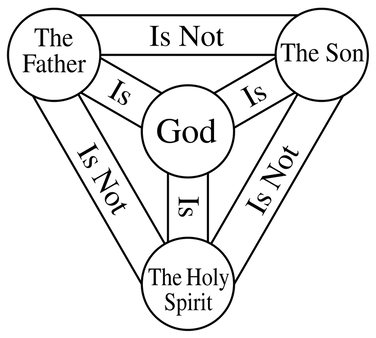The Trinity: Understanding the Divine
The Definition of the Trinity:
God is one being, yet three distinct, co-equal persons.
The Primacy of the Trinity:
The Trinity is a crucial theological doctrine in Christianity, deduced from the relationship between God the Father, God the Son, and God the Holy Spirit. Although not explicitly stated in Scripture, it is a foundational belief that reconciles the oneness and distinctiveness of the three persons.
The Mystery of the Trinity:
There's an inherent mystery in understanding the Trinity, similar to other aspects of God. Acknowledging the limitations of human comprehension, it's accepted by faith.* Isaiah 55:8–9, Romans 11:33-34
The Oneness of the Trinity:
Both the Old and New Testaments emphasize the unity of the Godhead. Deuteronomy 6:4 NIV, 1 Corinthians 8:6, Ephesians 4:6, James 2:19
The Plurality of the Trinity:
The Bible, particularly in Genesis 1:1, uses the plural form for the word God, laying the foundation for the triune expression of God. This concept is further developed in the Old Testament using plural pronouns (Genesis 1:26, 3:22, Genesis 11:7, Isaiah 6:8), and explicitly expressed in the New Testament (Matthew 28:19).
The Work of the Trinity:
The Trinity is fully expressed in salvation: to the Father, through the Son, by the Spirit. Ephesians 2:18
The Persons of the Trinity:
Theologian Lewis Sperry Chafer states, “The Father is presented as electing, loving, and bestowing. The Son is presented as suffering, redeeming, and upholding the universe. The Holy Spirit is presented as regenerating, indwelling, baptizing, energizing, and sanctifying.”**
In essence, the Trinity is a profound aspect of Christian theology that acknowledges the oneness and distinct roles of Father, Son, and Holy Spirit, even though the full understanding may remain mysterious.
God is one being, yet three distinct, co-equal persons.
The Primacy of the Trinity:
The Trinity is a crucial theological doctrine in Christianity, deduced from the relationship between God the Father, God the Son, and God the Holy Spirit. Although not explicitly stated in Scripture, it is a foundational belief that reconciles the oneness and distinctiveness of the three persons.
The Mystery of the Trinity:
There's an inherent mystery in understanding the Trinity, similar to other aspects of God. Acknowledging the limitations of human comprehension, it's accepted by faith.* Isaiah 55:8–9, Romans 11:33-34
The Oneness of the Trinity:
Both the Old and New Testaments emphasize the unity of the Godhead. Deuteronomy 6:4 NIV, 1 Corinthians 8:6, Ephesians 4:6, James 2:19
The Plurality of the Trinity:
The Bible, particularly in Genesis 1:1, uses the plural form for the word God, laying the foundation for the triune expression of God. This concept is further developed in the Old Testament using plural pronouns (Genesis 1:26, 3:22, Genesis 11:7, Isaiah 6:8), and explicitly expressed in the New Testament (Matthew 28:19).
The Work of the Trinity:
The Trinity is fully expressed in salvation: to the Father, through the Son, by the Spirit. Ephesians 2:18
The Persons of the Trinity:
- The Father is God, guiding authority over the Son, creator and owner of all things, the source of blessings, and ultimate purpose. 1 Peter 1:2; John 6:27; 1 Corinthians 15:24; Galatians 1:1,3; Ephesians 5:20
- The Son is God, radiating glory, forgiving sins, raising the dead, the preexistent source of all things, the future judge, and the human expression of God. Titus 2:13; John 1:1, 5:18, 10:33; Philippians 2:6
- The Holy Spirit is God, authoring revelation, giving eternal life, enabling diverse languages, raising Jesus from the dead, and affirming the truthfulness of Scripture. Acts 5:3-4, Genesis 1:2; 1 Corinthians 3:16; 2 Peter 1:21
Theologian Lewis Sperry Chafer states, “The Father is presented as electing, loving, and bestowing. The Son is presented as suffering, redeeming, and upholding the universe. The Holy Spirit is presented as regenerating, indwelling, baptizing, energizing, and sanctifying.”**
In essence, the Trinity is a profound aspect of Christian theology that acknowledges the oneness and distinct roles of Father, Son, and Holy Spirit, even though the full understanding may remain mysterious.
The Trinity Diagram
Resources
- Read: What Does the Bible Teach About the Trinity? Got Questions
* Charles C. Ryrie, Ryrie Study Bible (Chicago: Moody, 1995), 62.
** Lewis Sperry Chafer, Major Bible Themes: 52 Vital Doctrines of the Scripture Simplified and Explained (Grand Rapids: Zondervan, 1974), 45.
** Lewis Sperry Chafer, Major Bible Themes: 52 Vital Doctrines of the Scripture Simplified and Explained (Grand Rapids: Zondervan, 1974), 45.
